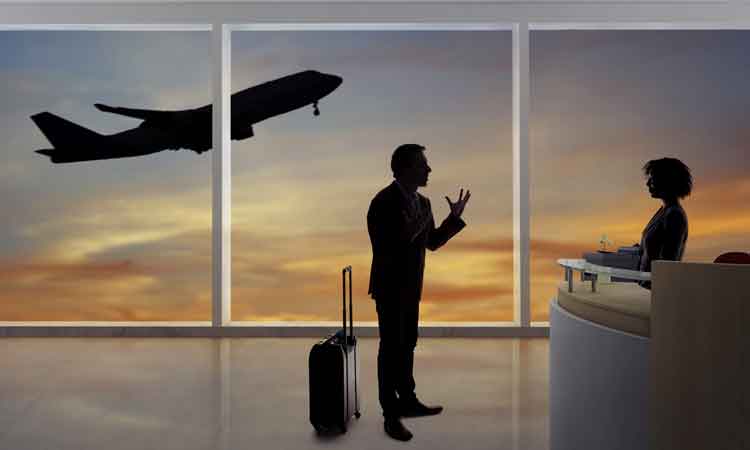Supporting airport workers during the pressures of COVID-19
By Daniela Modonesi, Eoin Coates
17 May 2022
Shares
Eoin Coates, Head of Aviation and Daniela Modonesi, Ground Staff Committee Chair at the European Transport Workers’ Federation, explain that since the COVID-19 pandemic, unruly and disruptive passengers have become increasingly evident throughout airports, but regulations must be enforced to prevent any further distress to aviation employees.


Lack of clarity in the travel system
Despite heavy industry lobbying for a simpler and more transparent travel system during COVID-19, states have still failed to provide the necessary infrastructure and clarity to staff, passengers, and operators to prevent incidents occurring in airports. The lack of action has led to the unforeseen consequence that frontline aviation workers are subject to greater physical, emotional, and mental abuse from passengers, as well as airports, airlines, and ground handlers all suffering from increased delays and costs, due to preventable issues.
But this is not a new phenomenon. Airports are stressful environments for many passengers, and that stress can sometimes lead to anger and frustration then directed at workers. In the 1990s and early 2000s, there was the first sharp increase in the amount of disruptive passenger incidents in airports, which coincided with the creation of baggage charges by lowcost carriers. While a good revenue stream for airlines, this provided a major challenge for workers as they were forced to confront passengers with further unexpected costs which caused significant tensions. To some extent, the travelling public has grown to accept this practice, but these day-today issues still cause great disruption today. Despite the verbal and sometimes physical violence, aviation workers have built the skills to adapt to their role in confronting passengers and continue to adapt to new roles and tasks.
In 2020 however, the industry changed forever, and this was evident in the boarding and check-in process which had become increasingly more complicated due to the complex and ever-changing documentation demands on passengers. Unfortunately for passengers, if they do not have the documentation in place, the result is simple, they are denied boarding. But once again the workers on the ground were the ones to manage this, placing themselves in the firing line between angry passengers and demanding airlines.
The first hotspot for disruptive passengers is check-in
Airlines have applied different procedures to the check-in process since the beginning of COVID-19, but most have removed the automated element, demanding passengers to return to face‑to‑face check-in desks. This allowed check-in employees to assess the documentation requirements for a passenger’s destination, and with whatever information was available to them, then, decide if the passenger had completed the required paperwork or not. This process increased the burden and pressure on both the passengers and employees in aviation, and most ground handling workers spent hours daily trying to understand the latest rules regarding whichever airline and country they were operating flights for today. The never-ending complexity and changes led to major delays as workers and passengers tried to adapt to rules, which were changing daily. But unfortunately, many passengers voiced their frustrations directly at check‑in staff, and hundreds of videos online display the verbal and physical abuse check-in employees have endured from passengers for simply working as instructed. Some prominent cases reported over the pandemic period include a gate agent being punched by a passenger in Spain, and a belt barrier being thrown at a check-in agent in Brazil.
Confrontation at the gate
But the situation at the gate was much the same. Some airlines did not have the capacity or willingness to revert to manual check-in, and instead rely on passengers to show up to the gate with their documentation in hand. This proved even more challenging as many passengers did not have the proper documentation but had already made it airside, which caused an even greater security challenge. Again, frontline airport workers were forced to deal with these issues and where possible to engage with the airport police or security services. In some airports, this even resulted in security being permanently based at gates to deal with the inevitable disruptive passenger incident, which has become an expectation rather than an exception.
Campaigning for awareness and action
Currently, there is no end in sight for COVID-19 travel documentation and border restrictions. Despite domestic restrictions slowly being lifted, the requirement for vaccination and a Passenger Locator Form (PLF), at a minimum, in almost all countries remains and for that reason there is no break in sight for ground workers. As a result, the European Transport Workers’ Federation (ETF), has begun campaigning for more awareness during the pressures of COVID-19 and support for ground staff, who are forced to endure this consistently high level of abuse. The ETF and its members are campaigning for more acknowledgment and faster action to deal with disruptive passenger incidents, ways to increase awareness and stop repeat offenders. To achieve this, workers and their employers must work together with other stakeholders like airport operators and airlines to ensure basic steps are taken to support employees and prevent incidents. All actions must ensure that the airport remains a safe workspace, and a safe environment for passengers.
While the campaign is within early stages, the ETF aims to:
- Engage with local police and security services to address incidents quickly
- Provide information to passengers on consequences and illegality of verbal and physical abuse on airport workers
- In the most severe cases, stop repeat offenders from engaging in abusive behaviour through measures preventing them from travelling
- Provide training to staff to de-escalate disruptive passengers, recovering service, and managing aggressive behaviour
- Provide staff with supports to deal with mental health issues stemming from disruptive passenger incidents.
Assaults on workers are an issue for the whole aviation industry and all parties agree that these issues must stop, but for that we need a concise and industry-wide response. The psychological and physical stress associated with these assaults are fast becoming an occupational risk of working in the ground handling sector, and is a risk that is entirely preventable.

















